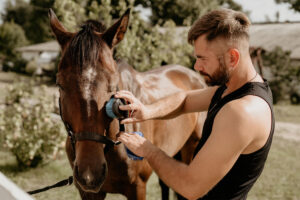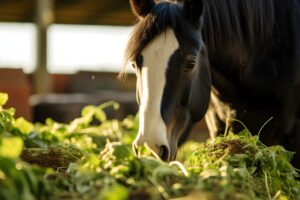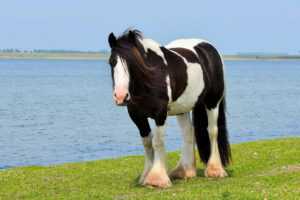
Feeding a Hard Keeper Horse: Horses are available in all shapes and sizes, and whilst some seem to maintain a healthy weight results easily, others are taken into consideration tough keepers, a hard keeper is a horse that struggles to keep or benefit weight in spite of a reputedly appropriate diet and care. These equines frequently pose a completely unique project for his or her owners, however with the proper approach to nutrition and control, their fitness and circumstance can be advanced. In this comprehensive manual, we will explore the intricacies of feeding a tough keeper horse, along with understanding the underlying reasons, designing a tailored weight loss plan, and implementing effective management strategies.
Understanding the Hard Keeper
Before delving into the specifics of feeding a difficult keeper, it’s critical to apprehend the traits of those horses and recognize why they conflict to keep weight. A difficult keeper may additionally exhibit the following trends:
1. Ribs and Backbone Prominent: Despite regular feeding, the ribs and determination of a tough keeper are visibly outstanding, indicating inadequate muscle and fat cowl.
2. Low Body Condition Score: They usually have a low frame circumstance rating (BCS), frequently falling below an appropriate variety of five-6 on a nine-factor scale.
3. Increased Metabolism: Hard keepers generally tend to have a quicker metabolism, burning energy fast.
4. Active or Nervous Disposition: Some tough keepers are certainly extra energetic or anxious, which could make contributions to weight loss.
5. Health Issues: Underlying health issues, such as dental troubles, gastrointestinal issues, or parasites, can also make weight maintenance difficult.
Evaluating Your Horse
The first step in addressing a difficult keeper’s nutritional wishes is to conduct a radical assessment of the horse. This evaluation must encompass diverse components, which include:
1. Body Condition Score (BCS): Determine the horse’s cutting-edge BCS to gauge the severity of the issue. This score will function a baseline for tracking development.
2. Veterinary Examination: Schedule a veterinary takes a look at-up to rule out any underlying fitness problems that might be contributing to the weight loss.
3. Dental Check-Up: Ensure the horse’s enamel are in desirable circumstance, as dental troubles can avert right feed utilization.
4. Parasite Control: Establish a regular deworming agenda and recall fecal egg counts to manage internal parasites effectively.

Designing the Diet for a Hard Keeper
Once you have evaluated your hard keeper and addressed any underlying health issues, it is time to expand a tailored feeding plan. Keep in thoughts that there is nobody-length-suits-all technique, as each horse is specific. Here are the key components to don’t forget:
1. Quality Forage: High-pleasant forage is the foundation of any horse’s eating regimen, in particular for hard keepers. Opt for nutritious grass hays, consisting of timothy or Bermuda grass. Alfalfa also can be useful because of its better calorie and protein content.
2. Quantity of Forage: Hard keepers need extra forage than the common horse. Offer advert-lib access to hay or pasture to inspire constant grazing, which facilitates preserve a consistent calorie intake.
3. Supplement with Concentrates: In addition to forage, concentrate feeds have to be covered inside the food plan. Choose feeds with higher fat content, as fats is a dense source of calories. Look for feeds designed for hard keepers, frequently categorized as whole or senior feeds.
4. Gradual Increase: Make nutritional adjustments step by step to avoid digestive disenchanted. Slowly introduce new feeds or growth the amount over numerous days to allow the pony’s intestine to modify.
5. Balanced Diet: Ensure the diet is balanced with suitable stages of nutrients and minerals. Consult with an equine nutritionist if important to formulate a balanced ration.
6. Monitor Weight and Adjust: Regularly verify your horse’s weight and body condition. Adjust the weight loss plan as needed to acquire gradual, wholesome weight benefit.
Feeding Management Strategies
In addition to tailoring the weight loss program, right feeding control is crucial for a hard keeper’s success. Here are a few strategies to bear in mind:
1. Frequent Feedings: Offer smaller, greater common food at some point of the day. This method can assist preserve a regular influx of energy and decrease the threat of digestive issues.
2. Slow Feeders: Implement gradual-feeders or hay nets with smaller openings to sluggish down hay consumption, making the forage remaining longer.
3. Avoid Overfeeding Grain: While concentrates are important, overfeeding grains can result in digestive problems. Follow the manufacturer’s suggestions and consult an equine nutritionist for customized suggestions.
5. Regular Dental Care: Schedule routine dental checks to ensure proper chewing and digestion of feed.
5. Minimize Stress: Reduce sources of strain within the horse’s environment, as stress can contribute to weight reduction. Provide adequate turnout time and social interplay with different horses whilst possible.
6. Supplement Wisely: Consider the usage of dietary supplements, including probiotics or digestive aids, to help intestine fitness. Always discuss with a veterinarian before adding dietary supplements to the eating regimen.
Exercise and Muscle Building
Incorporating a properly-rounded exercising regimen is critical for a hard keeper. Exercise no longer handiest allows burn calories however additionally builds muscle mass, improving normal frame condition. Here are a few workout considerations:
1. Balanced Exercise: Include a combination of cardiovascular workout, consisting of trotting or cantering, and power-constructing physical activities like hill paintings and pole paintings.
2. Consistency: Establish a ordinary exercise routine to hold muscle tone and encourage appetite.
Three. Gradual Increase: Just as with nutritional adjustments, introduce exercising steadily to save you injury.
Patience and Monitoring
Feeding a tough keeper horse is a journey that requires persistence and regular tracking. It’s essential to apprehend that vast changes might not occur overnight, and a few horses may continually require extra interest to hold their weight. Regularly song your horse’s BCS, modify the eating regimen and exercise routine as wished, and discuss with equine experts to ensure you are on the right music.
Conclusion
Feeding a difficult keeper horse can be a challenging however worthwhile enterprise. By knowledge the person horse’s needs, addressing any underlying health troubles, designing a tailored weight loss plan, and enforcing proper feeding control and exercise techniques, you could assist your hard keeper gain and maintain a healthy weight and usual well-being. Remember that every horse is specific, so an affected person and adaptive approach is fundamental to fulfillment. Always visit equine experts, along with veterinarians and equine nutritionists, for steering particular for your horse’s situation.






